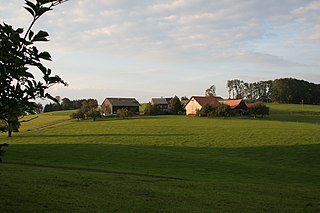Related Research Articles

The family Dipluridae, known as curtain-web spiders are a group of spiders in the infraorder Mygalomorphae, that have two pairs of booklungs, and chelicerae (fangs) that move up and down in a stabbing motion. A number of genera, including that of the Sydney funnel-web spider (Atrax), used to be classified in this family but have now been moved to Atracidae.

A hamlet is a human settlement that is smaller than a town or village. This is often simply an informal description of a smaller settlement or possibly a subdivision or satellite entity to a larger settlement. Sometimes a hamlet is defined for official or administrative purposes.
The Nalik language is spoken by 5,000 or so people, based in 17 villages in Kavieng District, New Ireland, Papua New Guinea. It is an Austronesian language and member of the New Ireland group of languages with a subject–verb–object (SVO) phrase structure. New Ireland languages are among the first Papua New Guinea languages recorded by Westerners.
Nedebang is a Papuan language spoken in the villages of Balungada and Baulang in the eastern district of Pantar island in the Alor archipelago of Indonesia. There are also Nedebang speakers in Air Panas, administratively part of Balungada but located 1 km from the main village.
Bukawa is an Austronesian language of Papua New Guinea.
Kala, also known as Kela, is an Austronesian language spoken by about 2200 people in several villages along the south coast of the Huon Gulf between Salamaua Peninsula and the Paiawa River, Morobe Province, Papua New Guinea.
Engdewu, also known as Nanggu or Nagu, is one of two Reefs – Santa Cruz languages spoken on Nendö Island.

Luilang, or ambiguously Ketagalan, was a Formosan language spoken south of modern-day Taipei in northern Taiwan by one of several peoples that have been called Ketagalan. The language probably went extinct in the mid-20th century and it is very poorly attested.
Skou, or Tumawo, is a Papuan language of Indonesia.

Tangkhul is a Sino-Tibetan language of the Tangkhulic branch, spoken in different villages of Ukhrul district, Manipur, India. The term "Tangkhul" is derived from the Meitei language terms, tāng and khūl . According to another theory, the term "Tangkhul" is derived from "Thankhul", meaning "Than village" in Meitei language.
Maklew is a language of the proposed Trans-Fly – Bulaka River family in South Papua, Indonesia. It is known to be spoken in Welbuti village, Merauke Regency. It is thought to be closely related to the Yelmek Language.
Bonerif is a Papuan language of Indonesia. It is closely related to Berik. The ISO 639 standard confuses it with Beneraf, another language in the same family.
Namuyi is a Tibeto-Burman language belonging to the Naic branch, spoken by approximately 10000 people. It is primarily spoken in southern Sichuan. Namuyi has also been classified as Qiangic by Sun Hongkai (2001) and Guillaume Jacques (2011). The eastern and western dialects have low mutual intelligibility. In Sichuan, it is spoken in Muli County and Mianning County. The language is endangered and the number of speakers with fluency is decreasing year by year, as most teenagers do not speak the language, instead speaking the Sichuan dialect of Chinese.
Tungag, or Lavongai, is an Austronesian language of New Ireland Province, Papua New Guinea, localized New Hanover, the native name of which is Lavongai.
Bannoni, also known as Tsunari, is an Austronesian language of Papua New Guinea. It has approximately 1,000 native speakers. The Banoni people refer to their language as Tsunari, but acknowledge the name Banoni and accept it as well. Tsunari technically translates to 'their truth'.
Musom is an Austronesian language spoken in the single village of Musom in Labuta Rural LLG, Morobe Province, Papua New Guinea. The other name for Musom is Misatik, given by the older generations because this was the name of the village that the ancestors settled on. Musom is currently an endangered language because native Musom speakers are continuing to marry other language speakers. Musom is also endangered because of its change in grammar and vocabulary due to its bi- and multilingualism. In the Musom village, other languages that Musom speakers may speak are Aribwuang and Duwet. In the Gwabadik village, because of intermarriages other languages that Musom speakers may speak are Nabak and Mesem.
Lovono is a nearly extinct language of the island of Vanikoro in the easternmost province of the Solomon Islands. As of 2012, it is only spoken by four speakers; it has been replaced by the island’s dominant language, Teanu.
ISO 639-3 code bnv may refer to the following Papuan languages of Indonesia:
EDWA is an abbreviation for erbium-doped waveguide amplifier. EDWA may also refer to:
Gopal Singh Shekhawat, also known as Gopal Singh Idwa is an Indian politician and the former Lok Sabha member, who represented Rajsamand constituency of Rajasthan state as the Member of the Bhartiya Janata Party.
References
- ↑ Edwas at Ethnologue (18th ed., 2015) (subscription required)
- ↑ "Edwas". New Guinea World. Retrieved 2020-02-12.